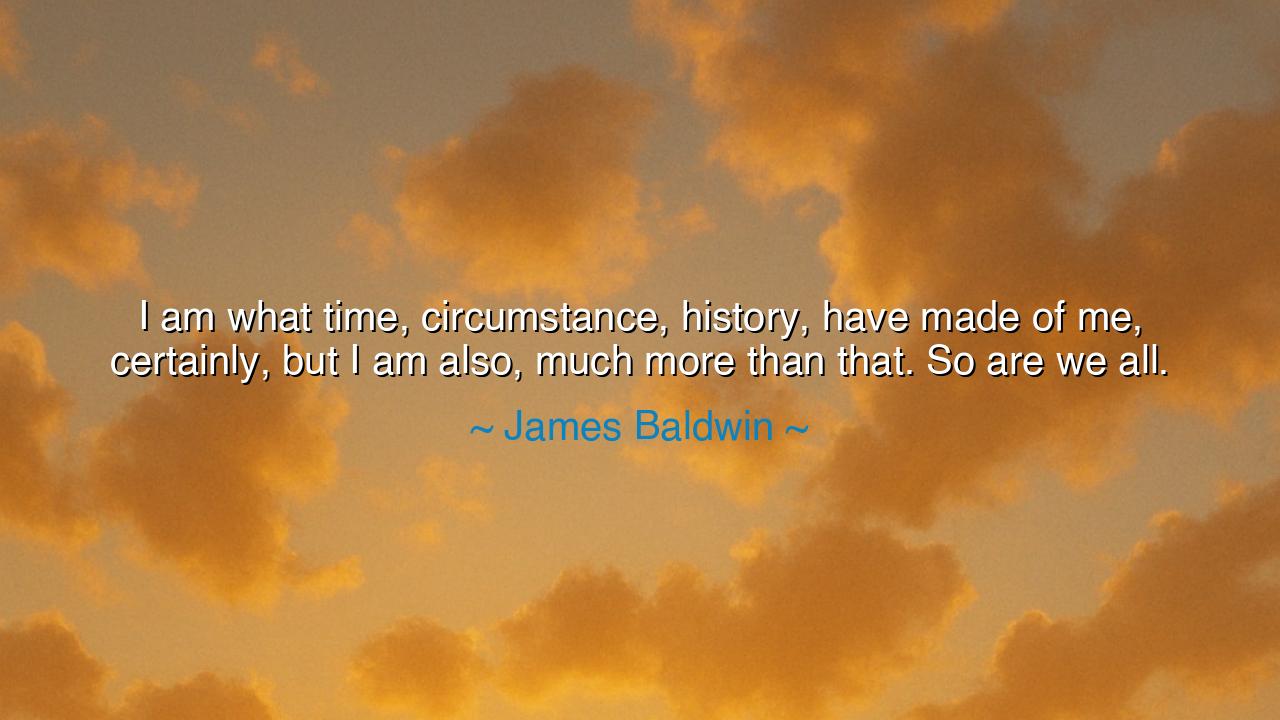
I am what time, circumstance, history, have made of me
I am what time, circumstance, history, have made of me, certainly, but I am also, much more than that. So are we all.






Hearken, O children of the world and seekers of self, and attend the words of James Baldwin, who spoke with the profound insight of one who knew both the weight of history and the limitless reach of the human spirit: “I am what time, circumstance, history, have made of me, certainly, but I am also, much more than that. So are we all.” In these words lies a meditation upon the shaping forces of life, the interplay of destiny and choice, and the enduring truth that while history molds us, it does not define the full measure of our being.
Baldwin reminds us that each individual is forged by the crucible of circumstance—by the time into which one is born, the society that surrounds, and the historical forces that sweep across life like mighty rivers. These elements shape character, opportunity, and perception. Yet Baldwin insists that within every human heart lies something beyond mere circumstance: a spark of autonomy, creativity, and transcendence that resists confinement, allowing each of us to rise above the narrow definitions imposed by history.
Consider the life of Frederick Douglass, who was born into slavery, shaped by the brutal circumstances of bondage and oppression. Yet through intellect, courage, and resolve, he became more than the sum of his hardships. He transcended the constraints imposed by time and circumstance to become a voice of justice, reason, and inspiration for generations. Baldwin’s insight is echoed here: while history may mold the individual, it cannot extinguish the innate capacity to exceed it.
The lesson extends beyond figures of legend. Every person, though influenced by family, culture, and historical epoch, possesses the power to define and expand themselves. The environment may set limits, and adversity may constrain, yet the human spirit contains an inexhaustible well of potential. Baldwin calls upon us to recognize that we are both products and creators, shaped by history, yet endowed with the ability to surpass it.
This duality—the shaping and the transcendent—is also seen in Malala Yousafzai, who faced the oppressive circumstances of life under the Taliban. Her courage, persistence, and voice transformed the narrative imposed by circumstance, elevating her into a symbol of resilience and advocacy for education. She embodies Baldwin’s vision: the forces of history influence us, but the choices we make and the courage we summon can render us more than circumstance allows.
From this reflection flows practical wisdom: study your history and circumstances, understand how they have shaped you, yet never mistake them for your entirety. Engage with your limitations, recognize the forces that press upon you, but nurture the inner potential that allows for transcendence. Cultivate thought, action, and creativity, so that you may shape your destiny rather than be wholly shaped by it. History informs, but does not imprison.
Baldwin’s words also remind us of empathy. Just as each individual contains more than the sum of circumstance, so too does each human story extend beyond surface judgments. In communities, societies, and nations, the recognition of the depth and complexity of others fosters understanding and cooperation. By appreciating that we are all influenced yet autonomous, we cultivate respect, dialogue, and justice, seeing beyond the simple measures imposed by circumstance.
Thus, remember: we are at once the product of history and the architects of ourselves. James Baldwin’s words teach that while time, circumstance, and history shape our paths, we possess a deeper, enduring essence capable of transcendence. Engage with your world fully, recognize your constraints, yet cultivate the inner power to rise above them. We are all more than history allows, and it is through this awareness that greatness, empathy, and true human freedom are realized.
If you wish, I can also craft a more dramatic, audio-ready version, vividly illustrating Baldwin, Frederick Douglass, and Malala Yousafzai, making the message of transcendence over circumstance emotionally resonant for listeners. Do you want me to do that next?






AAdministratorAdministrator
Welcome, honored guests. Please leave a comment, we will respond soon